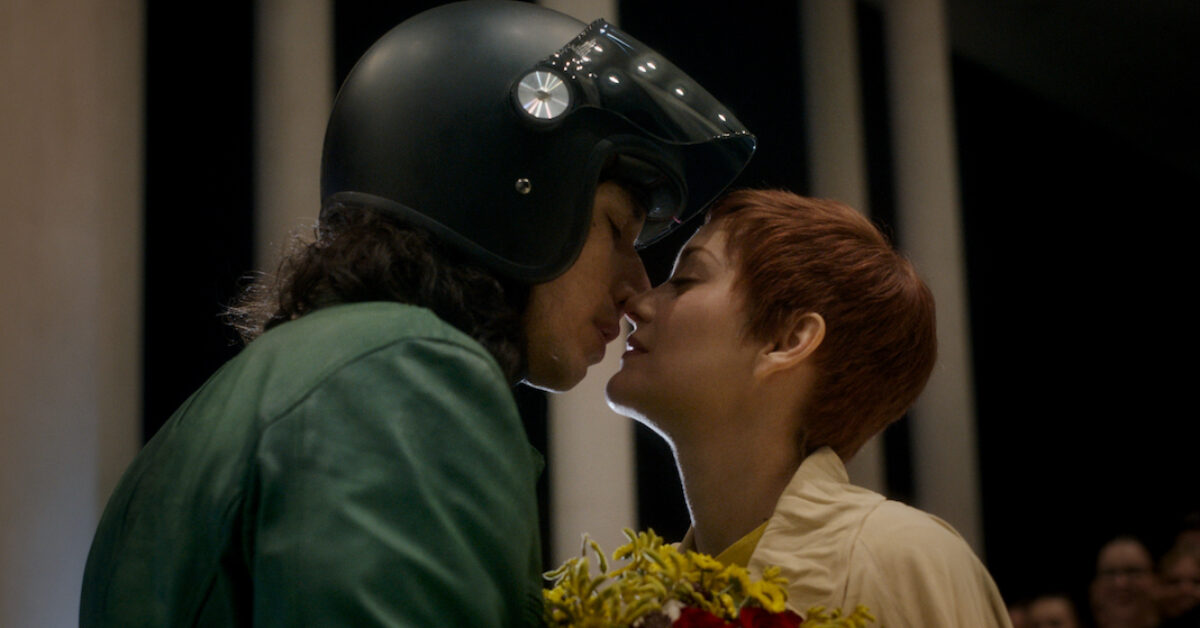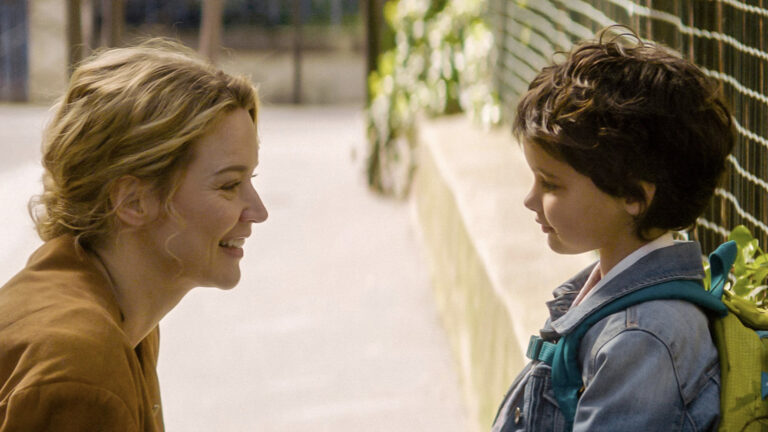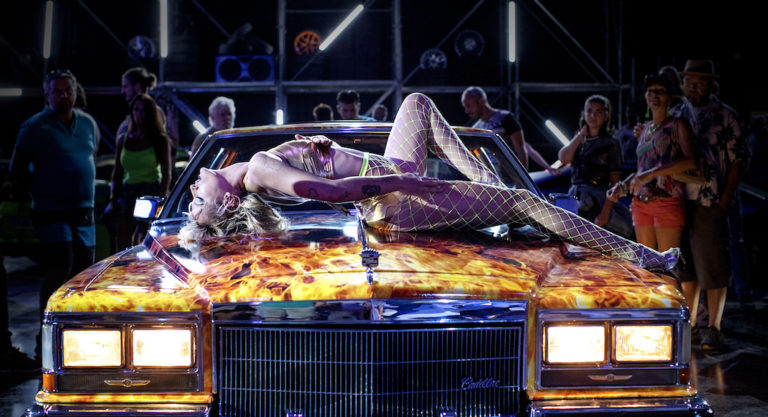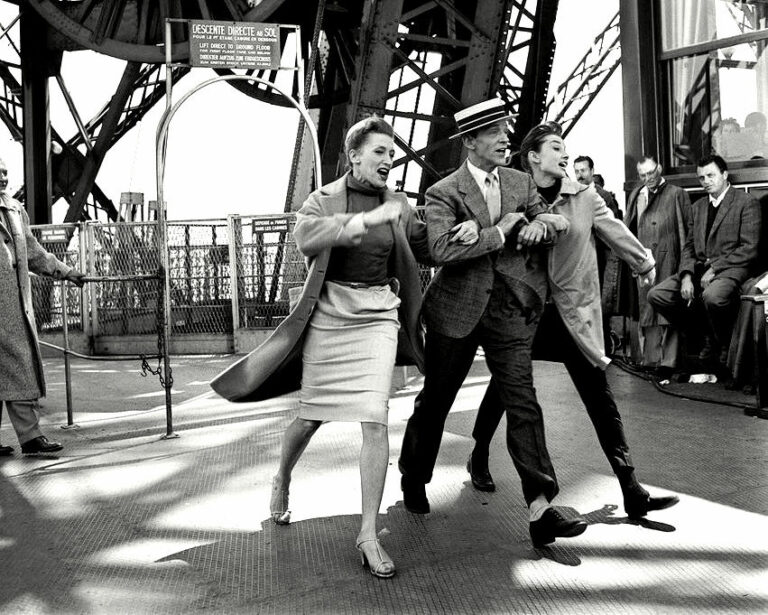[SPOILERS] For those of you who had “French-directed movie-musical starring Adam Driver and Marion Cotillard” on your 2021 bingo, congratulations—you’ve got a twisted mind, and the zeitgeist has provided.
Annette, which premiered at Cannes and was released in theaters on August 6, could be described as La La Land meets Chuckie. Yes, you read that correctly. Helmed by French director Leos Carax (Boy Meets Girl, Holy Motors), Annette tells the story of a doomed celebrity romance between controversial comedian Henry McHenry (Adam Driver) and beloved opera star Ann (Marion Cotillard).
The score, written by brothers Ron and Russell Mael of the pop duo Sparks, is sung live, not pre-recorded, by Driver and Cotillard, adding to its already surreal sonic effect. It’s yet another example of the Hollywood musical anti-trope-turned-trope of making an “unusual” or “realistic” musical by using non-singers in singing roles, a kind of musical mumblecore. Technically, both Driver and Cotillard have experience singing for film. Marriage Story (2019) featured a scene in which Driver sings “Being Alive” from the musical Company, and Cotillard has a history of recording music for film and TV, and even played a singer in the 2001 film Pretty Things, in which she sang the song “La Conne.” But any Broadway aficionado watching will likely walk away unimpressed by the musical performances, even if they can’t quite help getting the songs stuck in their heads.
If one had to guess what the message behind Annette is, the word “objectification” comes to mind. Driver plays a dark, violent man with a facial scar that grows and darkens as his villainy does (another fairy tale trope that has not aged well), and who envisions his wife as a kind of angel, pure and untouchable. In an early scene, when the two meet up after separate gigs and ask how they each went, Driver says: “I killed them. I destroyed them.” And Cotillard? “I saved them.” While we see comparatively little of Ann’s opera career, we are subjected to a director’s cut of Henry’s act, which seems to answer the question: what if Bo Burnham was a narcissistic serial killer? Henry’s abs have more definition than his jokes, and the only enjoyable part of this cringey display is the audience commenting in staccato choral arrangements.
Backstage, Henry eats a lot of bananas, and Ann is constantly munching on apples, in what feels like a page out of Symbolism For Dummies. But when the two stars have a baby, Annette, the symbolism gets even more blunt. The baby is played by a terrifying wooden puppet, which is later replaced by larger puppets as Annette ages. It doesn’t take long for Driver to take over the storyline and make it clear that the baby is inanimate because that is how he thinks of her, in one scene even accidentally sitting on the puppet, legs splayed helplessly on the sofa beneath him.
After Annette is born, allegations of violence begin to come out against Henry McHenry, and the public becomes less inclined to put up with his provocation-oriented style of performance, booing him off the stage. (A fun Easter egg for francophiles: one of Henry’s accusers is the francophone Belgian singer Angèle, in her first acting role.) Ann, on the other hand, only becomes more famous, and here is where the movie turns into a grim fairy tale. Out on a boat in the middle of a storm, in a rather visually dazzling scene, a drunk Henry forces Ann, dressed in a yellow rain slicker and hat, to waltz with him as the boat pitches to and fro, and she eventually falls to her death. Shipwrecked on an island, Henry and the now orphaned Annette are visited by a frightening nymph-ghost version of Ann, who threatens to haunt him using Annette as her surrogate. He later discovers that when light shines on the infant Annette, she sings and floats. What to do with this information? Well, exploit it, of course. Baby Annette embarks on a world tour, accompanied by “the Conductor,” a former friend and lover of Ann’s, who takes on a father-like role to Annette before also being murdered by Henry. (The Conductor is played wonderfully by Big Bang Theory’s Simon Helberg, who once again has been given the opportunity to showcase his piano skills.)
Henry’s crimes are eventually revealed and he is put away for good. In the last scene, he is confronted by Annette, who transforms into a real human child (played by Devyn McDowell), finally breaking the spell of Henry’s ignorance and malice.
In summary? Annette is a very white, very weird, trope-abusing movie likely to join the ranks of The Room, Troll 2, and Cats. It’s the kind of movie that builds camaraderie among movie-goers through trauma bonding, and there’s no need to worry if you see it in a crowded theater: because plenty of people will walk out. But for those special souls who get off on so-bad-it’s-good, this might be the spectacular catastrophe to add to your must-watch list.






